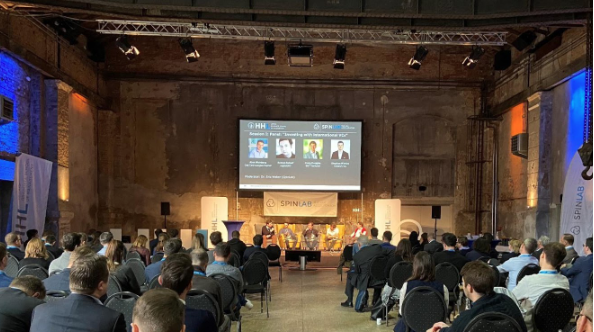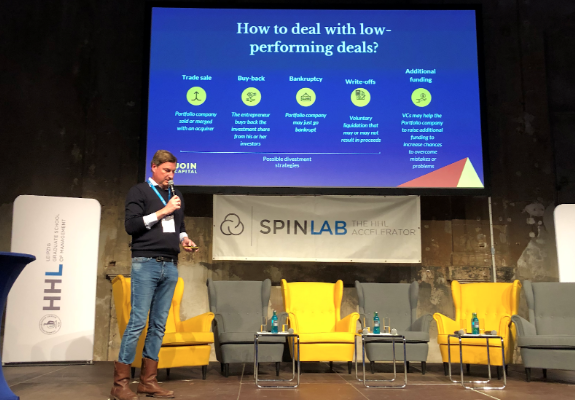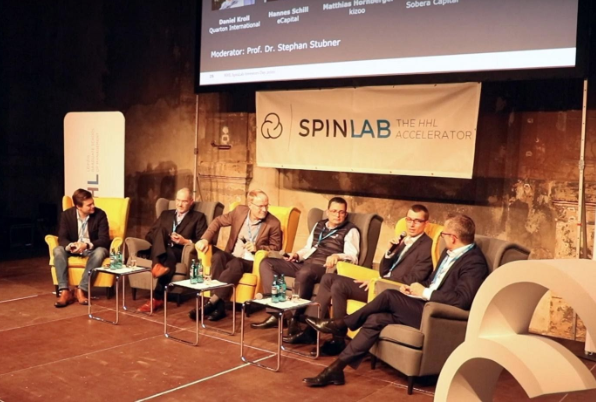About 200 venture capitalists, family offices and business angels mingled with our corporate partners and startups during the fourth HHL SpinLab Investors Day.
With networking sessions, inspiring speeches and panels accompanied by top-notch startup pitches, the likeminded community enjoyed the event. Focusing on the topics “Investing with international venture capitals” and “How to force exits?” both investors and founders were able to discuss important aspects of the same topics from their perspectives.
Investing with International Venture Capitals
While there is still a lack of Venture Capital in parts of the German startup ecosystem, many European Venture Capitalists are active not only in a specific country, but all across the continent.
Also, more and more US- and Asia-based investors enter the European market, especially in later funding stages. With their strong brands and deep pockets, they are not only role models for many European funds, but also a seal of excellence for European startups.
Therefore, both many founders and investors try to get on the same list of shareholders as famous international funds. But how?
Stephan Wirries, partner at Ventech, a venture capital fund who invested more than 700m€ in more than 200 European, US and Asian startups, stated that typical growth requirements of funds are the same worldwide.
Also, the time to close a deal does not depend on the involvement of international investors and easily takes up to four months and more in any case. He advises entrepreneurs to be perfectly prepared for pitches and negotiations.
So what are the takeaways?
#1 Take away: if you include international venture capital or not: deals take time and need professional preparation
In the upcoming panel, Stephan, but also other panelists like Alon Weinberg from Dell Technologies Capital, agreed that founders in other locations like the United States (US), Israel or China tend to be much better prepared than European due to better mentors and experience exchange.
Within Europe, Nordic and UK entrepreneurs stand out, while especially German founders tend to question market standards and keep on nitpicking, ignoring that both founders and investors try to team up to achieve something great together. Being to skeptical and pedantic removes dynamics and fun delaying or preventing good deals.
#2 Take away: US and Asian, but also Nordic and UK entrepreneurs are better prepared and open-minded than many German founders when it comes to VC funding.
This might be one reason why Dell Technologies Capital has a very limited number of European investments.
Also, the complexity and differences of European legal frameworks and the availability and competences of notaries can harm in some cases. Moreover, language and mental barriers play an important role.
No wonder that Craig Douglas (SET Ventures from Amsterdam) gave the advice for founders and investors to have every document and communication in English from day one. Both Alon and Craig agreed that having local co-investors, especially in Series A deals, is not only a good optional idea, but a mandatory input.
#3 Take away: Investors and founders should try to remove barriers for international investors, e.g. by having all documents in English from day one.
However, with the US and Israel getting more and more expensive in terms of startup valuations, not only Dell Technologies Capital tries to be more active on the German market. As Roman Scharf, who sold his own startup Jajah based in Mountain View for 207m$ to Telefonica and founded the Vienna-based VC capital300, sums up: “Europe is coming”.
And so are international funds. Scharf disclaimed that his former Jajah investor Sequoia, a world-famous venture capitalist, will open a European representation soon.
Recently, Samsung Catalyst just opened an office in Berlin. For him, this fits very well to his funds strategy to only invest in European deals, when he can get tier1 US co-investors.
More international investors will change the European ecosystem. Especially the bigger European funds might be the drivers who can attract them as co-investors to their top later stage deals. Smaller and less reputable funds may have to accept higher risks and invest earlier.
In addition, they may have to build stronger USPs, for example by focusing on certain niche topics. But overall the panelists agreed that no one has to be afraid of new competition but wait for additional investment opportunities alongside big international funds.
#4 Take away: More and more international funds will come to Europe with an impact to the ecosystem.
 First panel with Stephan Wirries, Alon Weinberg, Craig Douglas and Roman Sharf on international investors.
First panel with Stephan Wirries, Alon Weinberg, Craig Douglas and Roman Sharf on international investors.How to force exits?
In his keynote speech Jan Borgstädt, partner at JOIN Capital, emphasized that in the best case portfolio companies “are bought, not sold” due to a high demand of acquirers.
But besides all the war stories of successful Initial Public Offerings (IPO) and multi-billion trade sales, there is the quiet and hidden reality of low or average performing deals. In these cases, investors have a rather clear set of different (divestment) options:
- Trade Sales: sell or merge with an acquirer
- Buy-Back: sell the shares back to the entrepreneur
- Bankruptcy: file an insolvency
- Write-offs: in case of cash-flow positivity or turn-around chances write-off the asset and wait for improvements
- Additional funding: find new investors and even increase own risk
 Keynote by Jan Borgstädt from JOIN Capital
Keynote by Jan Borgstädt from JOIN Capital
In accordance with the following panelists, he agreed that this will most likely be the reality of a higher number of portfolio companies, while no one likes to talk about it.
While Jan Borgstädt highlighted that a startup cannot be sold without considering the interests and cooperativeness of the founders, Benedikt Battke from Grazia Equity pursued the diverging interests of entrepreneurs and investors when it comes to exits.
When investors want to force exits their returns might be optimized using liquidation preferences and they make sure that a deal will be realized accommodating the acquirers.
Sometimes, this is not beneficial for entrepreneurs. In the case founders initiate the exit, investors might lose bigger opportunities, since founders lose their motivation and get saturated.
So full transparency and regular discussions should be the strategy of choice according to Benedikt Battke and other panelists. eCapital partner Hannes Schill even recommends discussing potential exit options already at the beginning of the investment.
#5 Take away: A high number of exits will not be prestigious 10x cases. Investors and founder should be aware of different divestment options. Full transparency is beneficial for both parties.
That is why both sides, investors and founders, should consider their relationship as a timed one with a clear divorce at the end. A kind of common-law spouses (Lebensabschnittsgefährten).
Therefore, also founders should check the investment horizon of new shareholders. Especially in cases with very long sales cycles, complex technology development and/or strong and steep linear but not exponential growth opportunities, long-term oriented investors might be a better choice.
While classical venture capital funds usually are determined on ten years (often extended by another two years), evergreen funds, family offices or strategic corporate investors may have more endurance. As Matthias Hornberger, CFO at the evergreen venture capital fund Kizoo Technology Ventures, formulates: “we simply do not have that principle of harvesting after ten years.”.
#6 Take away: Founders should do their due diligence and check investment horizons. Sometimes, evergreen funds or family offices may fit better.
Investors with limited holding periods should also consider secondaries, a special case of trade sales, when financial (private equity) investors buy shares of individual companies or whole portfolios from previous investors and try to sell them at a higher price later on.
In Germany, the secondary market is just developing and not as mature as in the US.
Usually, secondary buyers require discounts on the previous valuation and therefore secondaries are said to be a suboptimal deal for sellers.
However, especially for founders who leave a company, early investors such as business angels or employees who want to monetize shares or ESOPs, secondaries are a highly interesting opportunity to not wait for a bigger trade sale or IPO.
One who should know best is Stefan Beil, partner at the secondary specialist fund Sobera Capital, who claimed: “second hand can be a first class solution.” While the panelists generally agreed, the devil is in the details. The complexity of secondary contracts and processes is quite high and incentive structures are difficult as well. Consequently, such as for any other exit as well, tailor-made processes are necessary, said Daniel Kroll, Director at Merger & Acquisition specialist Quarton International.
#7 Take away: Secondaries can be a first class solution
 Benedikt Battke, Stefan Beil, Matthias Hornberger, Daniel Kroll and Hannes Schill discussing forced exits
Benedikt Battke, Stefan Beil, Matthias Hornberger, Daniel Kroll and Hannes Schill discussing forced exitsNew opportunities for eHealth investors
Another part of the day was dedicated to recent regulative changes for digital medical products and eHealth applications.
Julia Hagen from the public agency Health Innovation Hub gave insights on the German “Digital Health Act” (Digitale Versorgungsgesetz). On the one hand, it brings legal simplifications for venture capital investments of compulsory health insurance funds.
These insurers hold huge reserves and will be allowed to invest a small fraction of them as limited partners into venture capital funds.
This alone has the potential to flush 400-500 million Euro into the startup ecosystem. Unfortunately, some legal questions such as warranties have yet to be answered.
On the other hand, providers of digital health products will be offered another market entry. Just as today, health insurers will still be allowed to negotiate selective supply contracts with solution providers.
But in addition, doctors will be allowed to prescribe digital health products when these own a medical license. In that case, insurers have to cover the costs for the patients.
This will be a new market entry strategy for eHealth startups, who can now convince doctors of their digital medical products.
Hopefully, this will be a dramatic acceleration and simplification of the market entry process. Professional investors shall now consider eHealth startups in order to benefit from the positive momentum.
#8 Take away: eHealth startups will gain great momentum in the next months and years through the Digital Health Act.
Pitch competitions
Overall, 14 startups pitched to the investors and corporate guests. The Best Pitches received a price composed of a jury vote (by Saskia Sefranek from signals, Alexander Witt from TGFS and Beatrice Böhm from Munich Venture Partners) and an audience vote.
The first prize, sponsored by the City of Leipzig and donated with 5.000€ was received by Aumio, a developer of a mindfulness app for children. The Karl-Kolle-Award, worth 3.000€ was awarded to DOCYET, a digital health navigator app.
Besides the professional exchange, networking supported by the event app dealroomevents and great startup pitches, the guests enjoyed two immersive-art shows at the event location Kunstkraftwerk Leipzig.
Just in case you want to learn even more: at our last HHL SpinLab Investors Day we focused on “Team Due Diligence” and “Brand building as VC”. Before that, we shed a light on “AI for Deal Sourcing” and “VC vs. public grants”, after we discussed “Crypto-VCs” and “Corporate Venture Capital – pros and cons”.






/RootCamp_Logo-Ecosystem.png?width=200&name=RootCamp_Logo-Ecosystem.png)
/Bitroad_Logo-Ecosystem.png?width=200&name=Bitroad_Logo-Ecosystem.png)



/White%20Versions/stadt_leipzig_white.png?width=130&name=stadt_leipzig_white.png)
/lfca_white.png?width=119&name=lfca_white.png)

/White%20Versions/sachsen_signet_white.png?width=65&height=79&name=sachsen_signet_white.png)